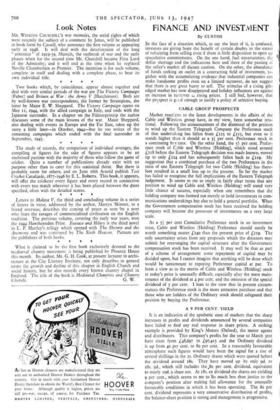FINANCE AND INVESTMENT
By CUSTOS
IN the face of a situation which, to say the least of it, is confused, investors are giving hope the benefit of certain doubts to the extent of refraining from selling even if there is little disposition to open up speculative commitments. On the one hand, fuel uncertainties, the dollar shortage and the indications here and there of the passing of the seller's market all dictate caution. On the other, the abundance of funds seeking an outlet in a contracting field of investment, to- gether with the accumulating evidence that industrial companies can make handsome profits even on a limited turnover, do not suggest that there is any great hurry to sell. The stimulus of a rising gilt- edged market has now disappeared and holiday influences are against an increase in turnover sa. rising prices. I still feel, however, that the prospect is gc c d enough to justify a policy of selective buying.
CABLE GROUP PROSPECTS
Market reactions to the latest developments in the affairs of the Cable and Wireless group have, in my' view, been somewhat irra- tional. Following the announcement of the dismissal of the petition to wind , up the Eastern Telegraph Company the Preference stock of that undertaking has fallen from £12.5 to £115, but even so it stands higher than it should as a 3J per cent. Preference stock in a continuing bus.ness. On the other hand, the 5-1- per cent. Prefer- ence stock of Cable and Wireless (Holding), which stood around £118 before the Eastern Telegraph decision was made known, moved up to only £124 and has subsequently fallen back to Li19. My suggestion that a combined purchase of the two Preferences in the ratio of one Eastern Telegraph for two Cable (Holding) has there- fore resulted in a small loss up to the present. So far the market has failed to recognise the full implications of the Eastern Telegraph judgement. It seems to me to imply in fairly clear terms that any petition to wind up Cable and. Wireless (Holding) will stand very little chance of success, especially when one remembers that the holding company was formed not merely to hold investments in com- munications undertakings but also to hold a general portfolio. When the Government compensation stock has been received the holding company will become the possessor of investments on a very large scale.
As a 51 per cent Cumulative Preference stock in an investment trust, Cable and Wireless (Holding) Preference should surely be worth something nearer £140 than the present price of £119. The only uncertainty arises from any proposals which the directors may submit for rearranging the capital structure after the Government compensation stock has been received. It may well be that as part of a scheme of arrangement some repayment of capital may be decided upon, but I cannot imagine that anything will be done which would be tantamount to repaying Preference capital at par. To form a view as to the merits of Cable and Wireless (Holding) stock at today's price is unusually difficult, especially after the mere main- tenance of the dividend at 4 per cent. and the omission of the special dividend of 5 per cent. I lean to the view that in present circum- stances the Preference stock is the more attractive purchase and that those who are holders of the Ordinary stock should safeguard their position by buying the Preference.
A 9 PER CENT. YIELD It is an indication of the apathetic state of markets that the sharp increases in profits and dividends announced by several companies have failed to find any real response in share prices. A striking example is provided by King's Motors (Oxford), the motor agents and distributors. This company's profits for the year to March 31st have risen from £48,697 to £97,415 and the Ordinary dividend is up from 40 per cent. to 8o per cent. In a reasonably favourable atmosphere such figures would have been the signal for a rise of several shillings in the 2s. Ordinary shares which were quoted before the dividend around 18s. They have moved up by only 9d. to 18s. gd., which still includes the .80 per cent. dividend, equivalent to nearly tod. a share net. At 18s. ex dividend the shares are yielding 9 per cent., which seems to me to to much less than justice to the company's position after making full allowance for the unusually favourable conditions ip -which it has been operating. The 8o per cent. dividend represents a very conservative distribution of profits, the balance-sheet position is strong and management is progressive.


































 Previous page
Previous page